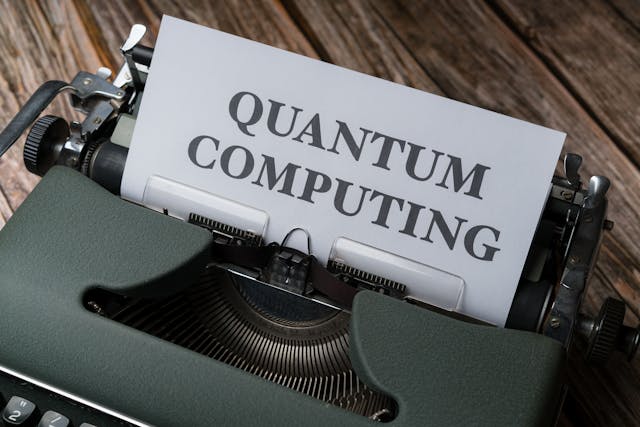Quantum machine learning utilizes algorithms that run on quantum machines like quantum computers in order to augment speed up accelerate or aid the tasks done by a conventional machine learning software. It is also known as quantum enhanced learning Quantum machine learning utilizes the information processing capabilities from quantum technologies to improve and speed the process of an machine learning model.
Although traditional computers are limited by their limited processing and storage capabilities quantum computers provide exponentially greater capacity in terms of storage and processing. The capacity to store and process massive volumes of data implies quantum computers are able to analyze huge data sets which would normally take conventional techniques a lot longer to process. In the end quantum machine learning makes use of this processing capability to speed up and increase the design of machine learning models as well as neural networks and various other kinds that make up artificial intelligence (AI).
Quantum machine learning makes use of quantum mechanics quantum computing and quantum mechanics to accelerate and improve existing computer learning carried out by traditional computers “classical” computers we use everyday. Quantum computers were designed together the sometimes contradictory quantum laws that can hold and process significantly more data than smartphones tablets as well as supercomputers which power a lot of the world today.
Quantum computers however are still a ways to travel before they are used within our daily lives. As per McKinsey and Company only approximately 2000 to 5000 quantum computers are likely to become operational in 2030 and the ones equipped to handle the most difficult problems might be in existence in 2035 or even later. However a number of businesses have started offering quantum computers that are accessible via the cloud and have created the possibility of hybrid work that combines quantum computing with traditional machine learning.

In this post this article you’ll discover more about quantum machine learning as well as quantum computers and the things they could be able to accomplish in the near future. In the final section well talk about quantum computing software that is cloud based that are available right now and a few classes that will benefit start your personal machine learning journey.
Quantum machine learning makes use of
From analyzing massive quantities of large information to powering transformational technological advancements quantum computing as well as machine learning are expected to be a major force in the coming years. Although the quantum technology of machine learning is only just beginning to be developed experts and researchers already together it in many methods. Certain of these applications pertain the following
- Create the latest algorithms for machine learning algorithmic techniques
- Accelerate already existing machine learning algorithms
- Utilize quantum enhanced reinforcement learning to create the machine learning algorithm is taught based on its interactions in the quantum world
- Make quantum neural networks that can be operated with less steps & have a higher processing speeds than conventional neural networks.
Even with these exciting applications nevertheless the field of quantum computing as well as machine learning is advancing and evolving. In the end lots of different applications that solve actual world issues will be developed in the near or distant near future.
Quantum Advantage in Machine Learning
- Optimized Optimization: Quantum algorithms can tackle certain optimization issues like the search for the universal minimum of an intricate function better than traditional algorithms.
- Enhanced pattern recognition: Quantum systems can utilize quantum mechanical properties including superposition and entanglement to recognize patterns within data more effectively and effectively.
- enhanced simulation and modeling: Quantum computers can simulate complicated quantum systems that is essential for use in areas like materials research discovery of drugs & climate modelling.
- More Speedy Data Processing In certain data processing as well as Machine learning models related applications such as database searches or machines learning modeling quantum techniques could bring significant speed increases.
Challenges and Limitations
- Hardware limitations Quantum computers are at the beginning stage of development & are facing issues like a the limited number of qubits errors rates & scaling.
- Algorithm Development: In the development of effective quantum machine learning algorithms that are superior to traditional methods is a thriving subject of research.
- Data availability: The effective application to quantum machine learning usually requires access massive high quality databases and this can result in an issue for certain areas.
- Integration with Classical Systems: Integrating quantum ML into conventional computing systems as well as existing infrastructure has been a constant issue.
Quantum machine learning models are expected to increase as quantum technology advances further offering new opportunities to boost problem solving and innovative solutions across a variety of industries and fields.
Types of Quantum Machine Learning
Quantum machine learning utilizes quantum algorithms in conjunction with machine learning methods in order to boost efficiency and quality of learning using the data. Quantum physics is used in conjunction with quantum computers to increase the abilities that machine learning. There are many kinds that use quantum machines for learning like:
Quantum Neural Networks (QNN)
They’re neural networks that work on quantum logic gates as well as qubits they are the primary quantum units. QNNs may leverage quantum effects like superposition and Entanglement to allow qubits to be in numerous states as well as show a the ability to interact with one another. QNNs are able to perform more quickly and better learning over traditional neural networks.
Quantum Support Vector Machines (QSVM)
They’re Support Vector Machine learning models that employ quantum algorithms to identify the most efficient hyperplane to divide the information points into distinct categories. QSVMs are able to use quantum speedup or quantum parallelism. These enable quantum computers to execute many simultaneous operations and resolve complicated problems more quickly than conventional computers.
Quantum Reinforcement Learning (QRL)
They’re reinforcement learning algorithms that make use of quantum agents as well as quantum environments to develop the most efficient policies and procedures. QRL utilizes quantum resources as well as quantum feedback to focus on providing quantum agents greater data and higher returns than conventional agents.
Applications of Quantum Computing
1. More Faster Algorithms
Through using the benefit in quantum computation it is possible to make algorithms learning on larger datasets quicker and more effective. Quantum computing QML algorithms will be quicker than traditional machine learning in which qubits play a an important role.
2. Solving Complex Data Patterns
Quantum computing may assist in finding complex patterns in data that aren’t addressed with traditional machine learning or deeper learning algorithms. Complex datasets where patterns and correlations between data aren’t easily identifiable and solve able together the QML could help.
3. Develop Advanced Algorithms
Quantum computing coupled with the use of machine learning could benefit create and develop the most advanced machines learning algorithms. Modern algorithms incorporated with quantum computing are able to solve more issues in fewer times and while achieving greater accuracy.
4. Advancement in Reinforcement Learning
Reinforcement learning can benefit substantially from the use of quantum computing principles. New concepts related to reinforcement learning are possible to develop and improved through quantum machine learning by using qubits.
5. Advanced Computer Vision
Quantum machine learning could also benefit to improve the application of computer vision as well as make already existing deep learning algorithms more efficient and effective. Thanks to quantum machine learning and the benefit by quantum machine learning we are able to develop better and more precise imaging segmentation and processing programs.
Classical Programs vs. Machine Learning
We might believe that machine learning is similar to classical programming this is not the case. Classical programming is where the input data is taken in to be processed then sent to the output presented. In this case we are given predefined procedures and guidelines that use the data then use functions and rules to it. Whatever outcome we achieve is displayed as the output of the program.

ML differs from traditional programming. the inputs are first split in two sections such as testing and training. After that the data from training is transferred into the ML program & no specific role is specified within the programs rules. The program learns through the data it has learned from as it is trained & then after that is tested using real values derived from test data. The loss function helps in identifying errors and mistakes that our model has made.
We have seen the fact that computer learning is totally different from traditional programming we will compare.
Machine Learning vs. Quantum Machine Learning
As we have mentioned machines learning is a type of software that uses data input as an input then preprocess it and then discover from it. Then the data from testing is used to assess the model. The loss of the model is computed.
The idea of molecules and atoms of quantum physics and build the model on data from training instead of the bits level. Quantum ML we use qubits that are superior to regular bits. Also we test the model with the data we have used for testing after it has been trained & calculate the loss function then strive to limit the loss.
What Exactly is Quantum Machine Learning?
With a clear understanding of classical programming machine learning and quantum computing now is the accurate opportunity to get acquainted with QML. This is a process of the integration of the traditional methods of machine learning and quantum computing using quantum computing to implement ML methods and concepts rather than relying on the classical computer and its programs.
The standard computer operates with bits having either 0 or 1. The same quantum computers also have qubits or quantum bits that can also hold information. It still utilizes the concept of superposition meaning that unlike traditional bits a qubit is able to be present in many states at the same time.
To grasp the idea behind superposition lets look at an illustration. There is a coin. It is tossed away to see if it will provide us with a tail or head. When we launch the cross or even while its spinning in the air you cant tell if its the heads or tails condition. This means that its partially at a heads or tails state adequate to the individuals perspective. We are talking about the idea of the superposition of a coin in which the coin is in several states at the same time.
The article was about the quantum aspect of machine learning and the ways it differs from conventional computer programming as well as machine learning. The article should benefit readers understand the meaning of and its fundamental idea and the ways it could help in the near future.
Expect that you will enjoy reading the article and gain a better understanding of quantum machines learning and the applications it impact & also quantum computing as well as machine learning.